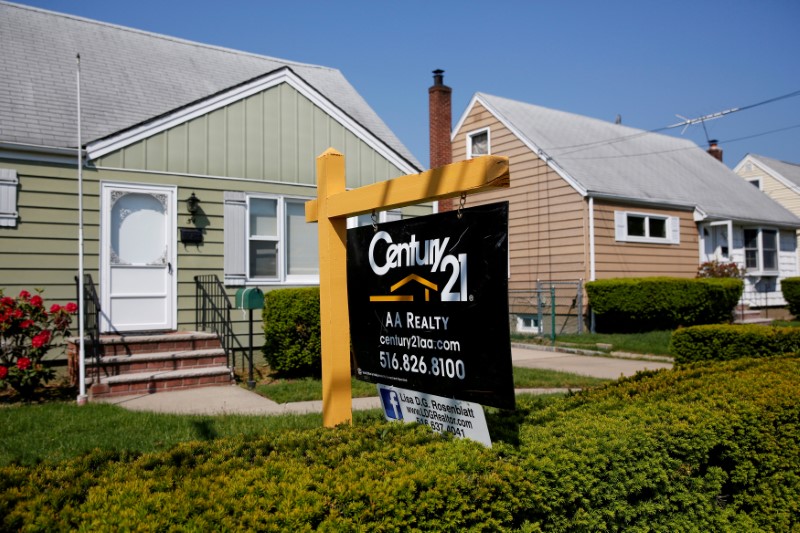 © Reuters. FILE PHOTO: A ‘House For Sale’ sign outside a single family house in Uniondale
© Reuters. FILE PHOTO: A ‘House For Sale’ sign outside a single family house in UniondaleBy Hari Kishan and Indradip Ghosh
(Reuters) – Growth of U.S. home prices will slow sharply next year along with economic momentum, according to a Reuters poll of property experts who largely said turnover in the housing market has peaked.
After falling by a third during the financial crisis a decade ago, U.S. house prices have mostly recovered all their losses, rising at more than double the rate of inflation and wages over the last five years.
The poll, a survey of 35 property market analysts from Nov. 16 to Nov. 26, showed U.S. house price growth is still expected to outpace inflation and pay growth over the next two years, but at a sharply lower rate than found in an August survey.
The S&P/Case Shiller composite index of U.S. home prices in 20 metropolitan areas was forecast to rise 3.7 percent in 2019 and 2.8 percent in 2020, down from 4.7 percent and 3.5 percent expected just three months ago.
“The peak in price increases has been reached and with rates rising further and the economy slowing, price gains can only decelerate,” said Joel Naroff, chief economist at Naroff Economic Advisors.
In the past, housing market activity has contributed significantly to overall economic expansion but there has been a growing disconnect between them this year.
That lines up with data over the last two quarters showing a slowdown in property market activity even though overall economic growth sped up strongly, in part on stimulus from tax cuts passed late last year.
A majority, 17 of 29 analysts who answered an additional question, said U.S. housing market turnover has already peaked.
That finding coincides with a strong consensus that U.S. gross domestic product growth has peaked too, according to a separate Reuters poll. [ECILT/US]
With growth of the economy now expected to slow by late next year to about half of the 4.2 percent rate of the second quarter, the risk is that the Federal Reserve does not increase interest rates as much as previously expected, the separate poll found.
For now, the Fed is expected to raise rates in December, the fourth increase this year, and three more times in 2019, according to that poll. Those expectations have already pushed mortgage rates higher.
After staying mostly below 5 percent since 2010, the 30-year mortgage rate breached that level last month and is forecast in the latest poll to stay above that level over the next three years.
In a sign rising rates are hurting demand, U.S. home refinancing requests fell to a near two-decade low last week, according to data from the Mortgage Bankers Association.
“Housing market activity has experienced a marked slowdown since the start of the year, as rising mortgage interest rates, tax reform and moderating house price expectations have all weighed on housing demand,” noted Matthew Pointon, property economist at Capital Economics.
There are also fewer houses up for sale.
Existing-home sales, which make up about 90 percent of overall sales, are forecast to average around an annualized rate of above 5 million units per quarter this year and next, well below the 7 million units during the housing market boom in 2005.
The latest Reuters poll is the third in a row where analysts cut their existing-home sales forecasts.
“The magnitude and speed at which home sales have weakened is surprising, following just a three-quarter of a percentage point rise in mortgage rates. We suspect the problem is a lack of affordable product in the markets where potential home buyers would like to live,” wrote Mark Vitner, senior economist at Wells Fargo (NYSE:), in a note to clients.
A shortage of affordable homes is a clear impediment to the housing market, where homebuilding has not kept up pace with demand driven by falling unemployment and improving wages over the last two years.
More than 85 percent of 27 analysts who answered an additional question said the supply of affordable homes over the next year will stay the same or fall. Only four expected an increase.
When asked to rate affordability of U.S. homes on a scale of 1 being the cheapest and 10 the most expensive, the median response was 7, where it has remained throughout this year, but higher than the 6 in polls last year.
(For other stories from the quarterly housing market polls:)
(Polling by Indradip Ghosh and Mumal Rathore; Editing by Ross Finley and Steve Orlofsky)
Source: Investing.com


























